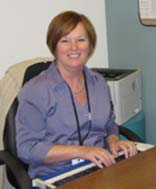Newsletter: June 2007
Protect Your Assets With Internal Control
reprinted with permission from the Arts Law Memo, published by St. Louis Volunteer Lawyers and Accountants for the Arts
Reducing the possibility of error, waste, mismanagement or fraud through internal controls will assure that your hard earned (or “unearned”) money is used efficiently and help maintain the public's trust. Internal controls are checks and balances that provide systematic procedures for authorizing expenditures, recording financial transactions, and safeguarding assets.
Internal controls can be interpreted as unnecessary red tape or as a sign of lack of trust. Another perspective is that, well applied, internal controls provide protection against unjustified suspicion or accusation.
Conversely, the absence of controls may create the impression that your organization is lax. When confronted, most embezzlers tell the same story: “I was only borrowing it. I was going to pay it back.”
Internal controls also address more than outright theft. They protect your organization from unscrupulous or careless vendors who send duplicate bills, employees who pad expense vouchers or time cards, and the wasteful use of supplies or equipment, including the telephone.
For small organizations, instituting internal controls can be a challenge because they traditionally rely on the segregation of duties. Ideally, no one person should handle all aspects of any financial transaction. The individual who submits an invoice, for example, should not sign the check to pay it.
A creative mix of board, staff, and volunteer responsibilities together with an organized “paper trail” can avoid errors of omission or commission without making the execution of your financial transactions overly burdensome.
Structure
To institute an effective internal control system, your organization should define and clearly communicate its policies and procedures. Flying coach is probably part of your nonprofit’s culture, but who decides on smaller 'luxuries,' such as when a package should be sent by Federal Express?
Your organizational structure should contain clear (and reasonable) lines of authority and clear definitions of responsibilities. Be sure that the people who handle your organization’s money, whether they are employees or volunteers, have sufficient competence to complete the assigned tasks. Do they have adequate training or related work experience? Have you clearly satisfied yourself about their financial integrity?
Procedures
Here are a few specific suggestions for translating the general principles of internal control into manageable procedures:
Cash Receipts. Cash and checks received by mail or at your box office should be counted independently by two people, matched with receipts or ticket stubs, and deposited in the bank ASAP. Checks should be stamped “for deposit only.” Deposit slips should be forwarded to the treasurer or bookkeeper immediately.
Cash Disbursements. Commitments for goods or services should be authorized by the budget or by a person in authority. Invoices should be approved with a signature and date before being submitted for payment. Set up a system that prevents an invoice from being paid twice.
Require two signatures on checks over a certain amount to discourage embezzlement.
Bank Reconciliation. Monthly reconciliation of your organization’s bank account should be done or at least reviewed by someone who did not prepare or sign the checks.
Records & Financial Statements. To ensure that transactions are legitimate and have been recorded accurately, concise and comprehensible financial statements should be prepared on a monthly or quarterly basis. Statements should contrast actual expenses and revenues with your annual budget. These comparisons often provide an early indication of problems and offer an opportunity for corrective action. They also help management in decision-making.
Protecting Assets. Keep a written record of your assets such as computers and other equipment. Make note of serial numbers. Take a periodic inventory.
The Board's Role
At the trial of William Aramony, a former president of the United Way of America, the defense lawyer accused board members of portraying his client in a bad light to cover up their own inattention to the affairs of the charity. The trial was a sober reminder that the public's trust in our nonprofit, tax-exempt organizations depends on adequate board oversight.
That trust, offered in recognition of our services, is acknowledged by the federal government which exempts us from corporate income taxes, offers us lower postal rates, and allows us to solicit tax-deductible donations. State and local governments waive sales taxes and license fees. They also subsidize our programs through grants.
To secure and maintain these privileges, nonprofits are almost always governed by an uncompensated board of directors. This onerous system makes the board, rather than the dynamic artistic director who had the insight and initiative to begin the organization, legally responsible for maintaining organizational accountability.
To meet their fiduciary responsibilities, board members need timely and accurate financial reports. They should approve the budget and monitor its progress. Under the business judgment rule, directors will not incur liability as long as there is a rational, informed basis for their decisions.
Ask an Accountant
Before expressing an opinion on the reliability of a company’s financial statements and its overall financial health, a CPA gathers evidence to support items in the balance sheet and income statement. The evidence includes looking at ledgers, journals, and other business documents.
The strength of your internal control system determines the reliability of those records. While a weakness does not necessarily indicate that the records are in error, it could suggest the possibility that the records supporting the financial statements may not be correct.
Typically, the accountant who is performing an audit or review will communicate any deficiencies in the design or operation of your system and make recommendations in procedures to increase operational efficiency.
Be Reasonable
Like all of your programs, your internal control system should be reviewed periodically and modified to accommodate changed conditions.
The concept of reasonable assurance recognizes that the cost of internal accounting control should not exceed the expected benefits. As a practical matter, the techniques you use should be tempered by the volume, complexity, and significance of the steps needed to impose them. Don’t get too elaborate.
As your organization grows, top management should be delegating and managing rather than approving every transaction.
Finally, no internal control system is expected to achieve perfection. But a system of checks and balances will ensure accountability to your donors and protect both management and the board from the appearance of wrongdoing.
Originally printed in the Arts Law Memo March 1995, published by the St. Louis Volunteer Lawyers and Accountants for the Arts (VLAA).
VLAA helps artists and arts organizations solve their legal and accounting problems. They operate a pro bono referral service and provide a wide variety of educational programs including seminars, a speaker's bureau, a resource library, and publications. They can be contacted through their website at www.vlaa.org/contactus.asp or by email at This email address is being protected from spambots. You need JavaScript enabled to view it. or by phone at 314-/863-6930.
Resources
Using FundRaiser to Support Your Internal Financial Controls by Larry Weaver
http://www.fundraisersoftware.com/library/newsletterarchives/2007fr06tip.html
 FundRaiser Software offers non-profit organizations intuitive donor management software that is easy to learn and easy to use. Three programs, ranging from simple to sophisticated, let you choose the features you need now, while guaranteeing a built-in growth path for the future. Software flexibility, budget options, and superb technical support make FundRaiser Software uniquely adaptable to the needs of non-profit organizations - whatever their mission.
FundRaiser Software offers non-profit organizations intuitive donor management software that is easy to learn and easy to use. Three programs, ranging from simple to sophisticated, let you choose the features you need now, while guaranteeing a built-in growth path for the future. Software flexibility, budget options, and superb technical support make FundRaiser Software uniquely adaptable to the needs of non-profit organizations - whatever their mission.









People are Talking!